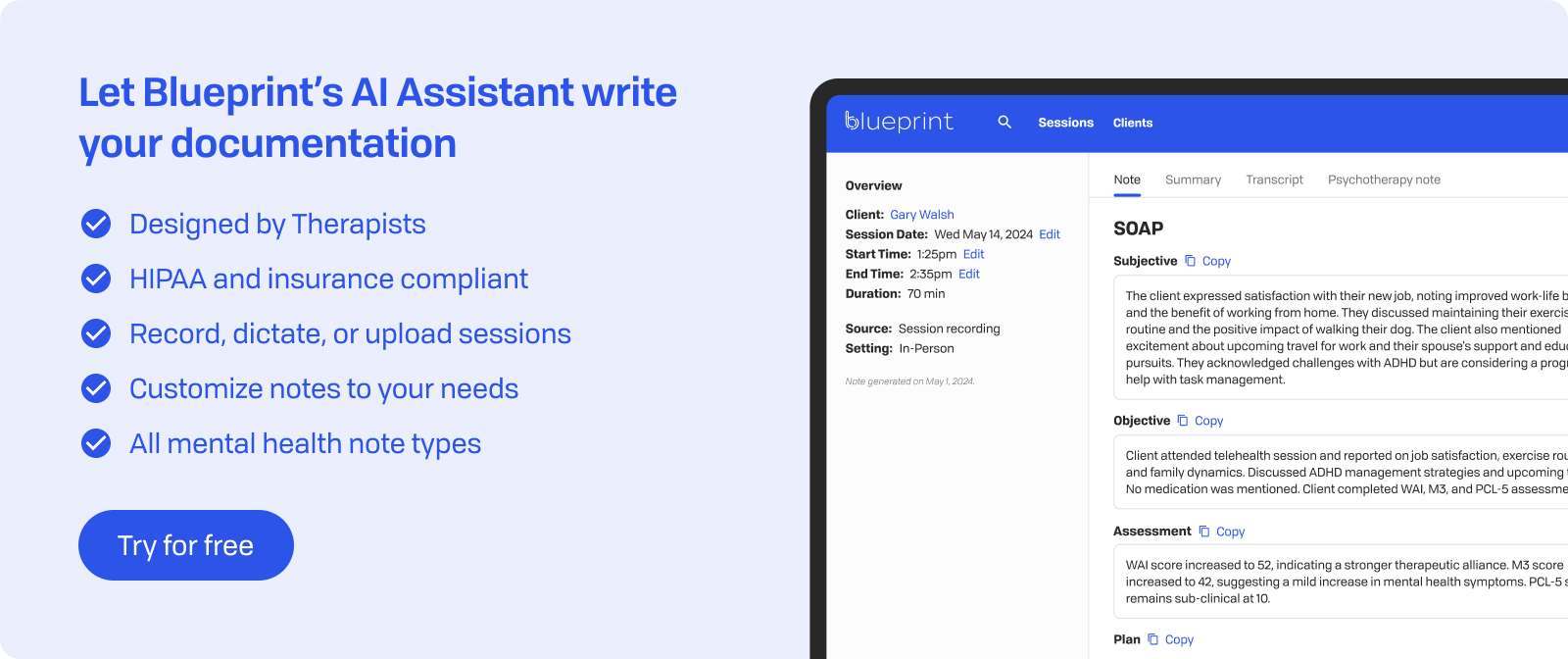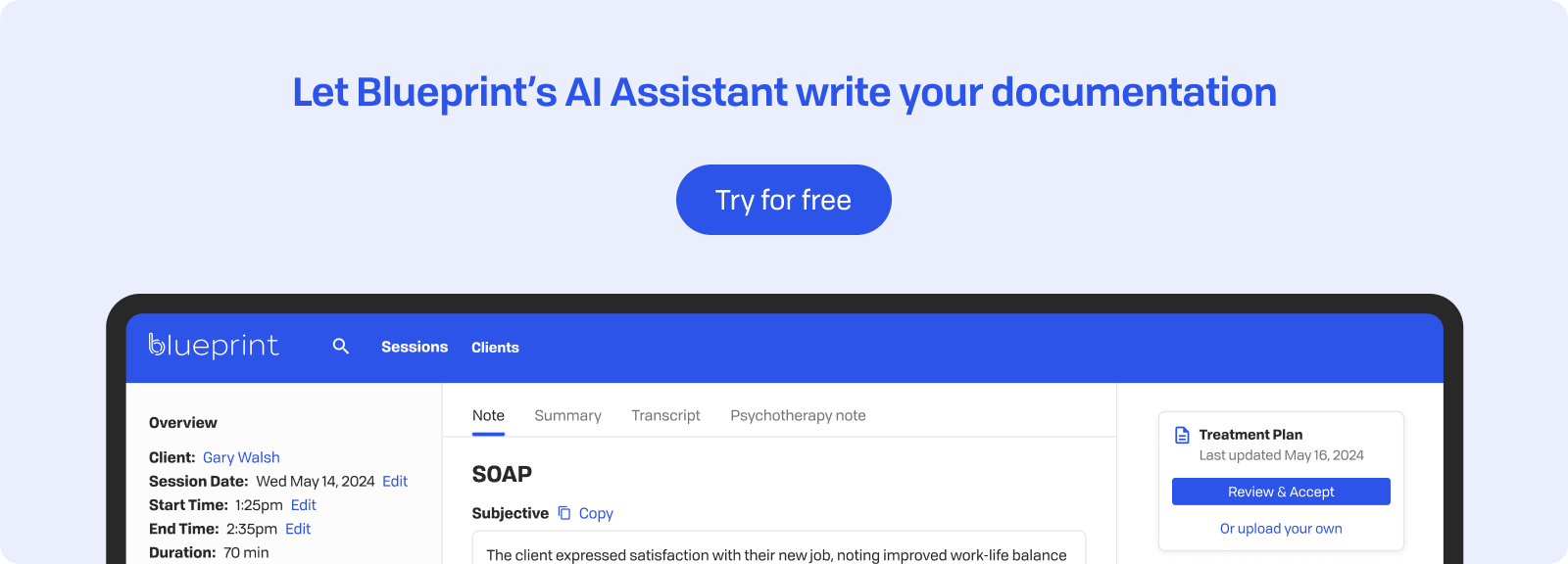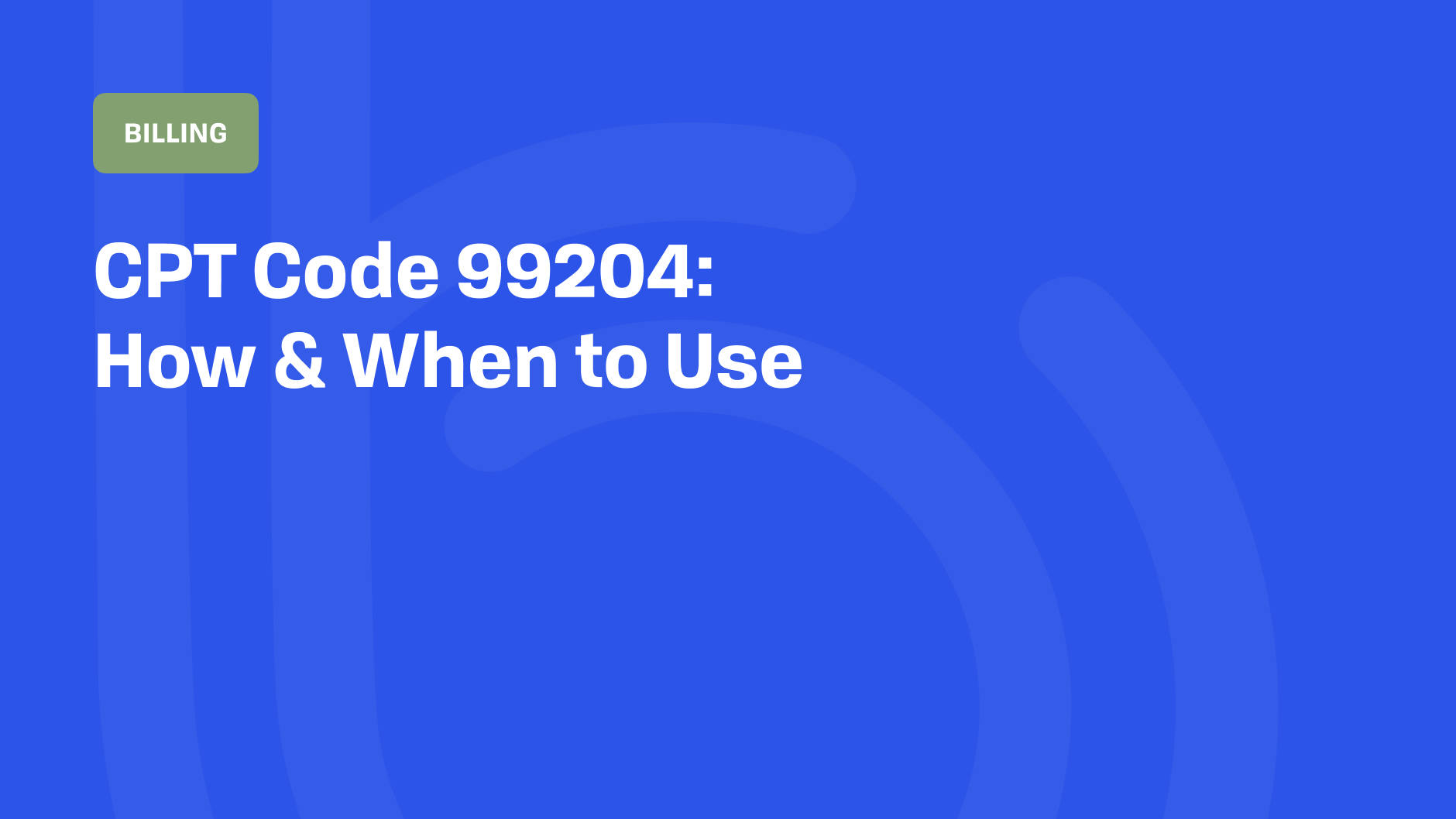In Brief
Navigating medical billing can feel overwhelming, especially when balancing excellent patient care with ensuring proper reimbursement. One frequently used code in mental health practices is 99204 among psychiatrists and other medication prescribers, yet many providers remain uncertain about its correct usage. Knowing how to use the code appropriately and its specific requirements can significantly impact your practice's financial health and compliance.
The distinction between different evaluation and management (E/M) codes often involves nuanced details that are easy to overlook. Correctly identifying these details is not just about reimbursement—it's about accurately representing the complexity and time investment of your clinical work. When you know exactly what documentation is needed and which clinical scenarios warrant specific codes, you can focus more on patient care and less on administrative concerns.
CPT code 99204 applies to a new patient office or outpatient visit with moderate complexity in evaluation and management. This code suits mental health providers, most often psychiatrists and psychiatric mental health nurse practitioners, conducting comprehensive initial assessments requiring substantial time and clinical decision-making. To use 99204 appropriately, you must meet specific documentation requirements showing the moderate complexity of medical decision-making during the encounter.
When to Use 99204
Use the 99204 code when conducting a new patient evaluation involving moderate complexity in medical decision-making. This typically occurs during initial psychiatric evaluations, where you assess for multiple mental health conditions, review past treatment history, and develop a comprehensive treatment plan. The complexity often arises from evaluating patients with multiple diagnoses, medication considerations, or significant psychosocial factors affecting their presentation.
Time significantly determines when to use 99204. The visit should involve 45-59 minutes of total time on the encounter date. This includes both face-to-face and non-face-to-face time spent on the patient's care, such as reviewing records, documenting, and coordinating care. However, when billing based on time, more than half of the visit must involve counseling or care coordination.
Your clinical evaluation when using CPT code 99204 should include a comprehensive history and examination appropriate for the presenting problem. This means gathering detailed information about the chief complaint, reviewing systems, obtaining past psychiatric and medical history, and conducting a thorough mental status examination. The depth of your assessment should reflect the moderate complexity of the patient's presentation and your clinical decision-making process.
Meeting all required criteria is necessary for compliant use of 99204. This includes documenting either the three key components (history, examination, and medical decision-making) at the appropriate levels and meeting the time-based requirements. Your documentation must clearly support the level of service billed, showing why the encounter required moderate complexity decision-making rather than a lower or higher level of service.

Required Documentation Components
To support the use of 99204, you need thorough clinical documentation that shows the complexity and comprehensiveness of your evaluation. Your clinical notes must clearly establish that you've met all necessary criteria for this level of service.
The comprehensive patient history forms the backbone of your documentation. This includes:
- Chief Complaint and History of Present Illness: Write detailed information about symptom onset, duration, severity, and associated factors
- Review of Systems: Cover multiple systems relevant to mental health, including sleep, appetite, energy, concentration, and physical symptoms
- Past Psychiatric History: Include previous diagnoses, treatments, hospitalizations, and medication trials
- Social and Family History: Note relevant psychosocial stressors, support systems, substance use, and family mental health history
Your examination documentation should reflect a thorough mental status exam addressing appearance, behavior, speech, mood, affect, thought process, thought content, perceptual disturbances, cognition, insight, and judgment. Include relevant physical observations that may impact mental health treatment.
Medical decision-making at moderate complexity requires documenting:
- Multiple diagnoses or treatment options: Show consideration of differential diagnoses
- Data reviewed: Mention any records, test results, or collateral information considered
- Risk assessment: Document suicide/homicide risk, substance use concerns, and medication risks
- Treatment planning: Include medication considerations, therapy recommendations, and coordination needs
When billing based on time, explicitly document the total minutes spent on the encounter date. Specify activities performed during this time, ensuring you've met the 45-59 minute requirement. Include a statement indicating that more than half the visit involved counseling or care coordination when applicable.
Time-Based Billing and 99204
The 2021 CMS guidelines made significant changes to how providers can justify using CPT code 99204. You now have the flexibility to bill based on either medical decision-making complexity or total time spent on the encounter date. When opting for time-based billing for 99204, the total time must fall between 45 and 59 minutes.
Knowing what counts toward your time is important. The total time includes:
- Face-to-face time with the patient: Direct clinical interview and examination
- Pre-visit activities on encounter date: Reviewing previous records, test results, or intake forms
- Care coordination: Consulting with other providers or family members
- Documentation time: Writing notes and treatment plans on the same day
- Ordering tests or referrals: Time spent arranging additional services
Proper time tracking documentation directly affects your reimbursement and audit protection. Record the exact start and stop times or state the total minutes spent. Include a brief description of how the time was spent, especially noting activities beyond direct patient contact.
Common time-tracking tips include:
- Use timestamps: Record when you begin reviewing charts and when you complete documentation
- Be specific: State "55 minutes total time" rather than "extended visit"
- Include all activities: Don't forget to count time spent on phone calls with pharmacies or consulting with other providers
- Same-day rule: Only count time spent on the actual date of service
Time-based billing is particularly useful for complex new patient evaluations that require extensive history gathering, psychoeducation, or care coordination that may not fully reflect in the medical decision-making documentation alone.

Reimbursement Considerations
Being aware of the financial aspects of CPT code 99204 helps you make informed billing decisions and ensures you receive appropriate compensation for your comprehensive evaluations. The reimbursement landscape varies significantly depending on your payer mix and geographic location.
Staying current with 2025 mental health CPT codes is crucial for proper coding and knowing what your reimbursement will be.
For Medicare, reimbursement rates are directly influenced by Geographic Practice Cost Indices (GPCIs), which adjust for regional differences in provider work, practice expenses, and malpractice costs. Urban areas with higher living and practice costs generally see positive adjustments, while rural areas may receive lower rates. Many private insurers also account for geographic cost differences, often using Medicare’s methodology as a benchmark.
Accurate coding protects you during audits and helps ensure you receive proper reimbursement. Undercoding 99204 when the service warrants it means leaving money on the table—potentially $30-50 per visit compared to lower-complexity codes. Conversely, overcoding invites scrutiny and potential recoupments. Consistent, accurate documentation supporting your code selection demonstrates compliance and helps you receive appropriate payment for the complexity of care you provide.
Regularly reviewing payer-specific fee schedules and staying current with annual updates ensures you're billing correctly and receiving full reimbursement for your services.
Common Mistakes to Avoid
Even seasoned mental health providers can make errors when using CPT code 99204. Being aware of these common pitfalls helps protect your practice from denials and ensures proper reimbursement.
Insufficient documentation is often the main reason for claim denials. Many providers document a comprehensive evaluation but fail to explicitly state key elements that justify moderate complexity. Your notes should clearly indicate:
- Multiple diagnoses considered or managed
- Review of external records or test results
- Prescription drug management considerations
- Moderate risk factors assessed
- Establishment of medical necessity
Incorrect complexity rating happens when providers either overestimate or underestimate their medical decision-making level. A straightforward anxiety evaluation without comorbidities typically doesn't meet moderate complexity criteria. On the other hand, evaluating a patient with multiple psychiatric conditions, medication interactions, and psychosocial stressors clearly warrants 99204. Review the Medical Decision Making (MDM) table regularly to ensure your assessments match the documented complexity.
Misuse of time tracking can lead to issues during audits. Common mistakes include:
- Counting time from previous or following days
- Including administrative tasks unrelated to patient care
- Failing to document exact minutes spent
- Not specifying that counseling/coordination exceeded 50% when using time-based billing
To prevent these problems, use consistent documentation templates that prompt you to address all required elements. Train staff on proper time-tracking procedures and establish clear guidelines for when to use 99204 versus other codes. Regular internal audits of your documentation can catch issues before payers do, allowing you to refine your processes and maintain compliance while ensuring appropriate reimbursement for your comprehensive evaluations.

Ethical and Compliance Implications
Your practice's integrity relies heavily on ethical billing practices, especially when using higher-complexity codes like 99204. Misrepresenting services through upcoding not only breaches professional ethics but can lead to serious consequences such as recoupment demands, exclusion from insurance panels, and potential legal action.
Ethical billing means every element of your documentation must accurately reflect the service provided. If your evaluation lasted 40 minutes, billing 99204 (which requires 45-59 minutes) is fraudulent, no matter how complex the case seemed. Similarly, labeling routine intake assessments as moderate complexity when they lack the required elements breaches both ethical standards and payer contracts.
To maintain ethical compliance:
- Document truthfully: Record the actual time spent and complexity encountered, not what you think justifies higher reimbursement.
- Stay updated with guidelines: Coding rules change annually, and not knowing them doesn't protect you from compliance violations.
- Ask for guidance when unsure: Consult coding resources, attend training sessions, or work with billing specialists rather than guessing.
- Conduct regular self-audits: Periodically review your own documentation to ensure it aligns with your billing patterns.
- Create clear policies: Develop practice standards that prioritize accuracy over increasing reimbursement.
Remember, you are ultimately responsible for the codes submitted under your name, even if staff handle billing. When documentation doesn't clearly support 99204, choosing a lower-level code safeguards your license and reputation. Ethical providers understand that long-term practice success comes from honest billing practices, not from stretching coding limits.

Key Takeaways
CPT code 99204 represents a specific level of new patient evaluation that requires careful attention to documentation and time requirements. Here are some important points every mental health provider should remember:
- New patient requirement: The patient must not have received services from you or anyone in your practice group within the past three years.
- Time parameters: Total encounter time should be between 45-59 minutes on the date of service, including both face-to-face and non-face-to-face activities.
- Moderate complexity MDM: Your documentation must show moderate medical decision-making through multiple diagnoses, data review, or moderate risk assessment.
- Comprehensive documentation: Include detailed history of present illness, review of systems, past psychiatric history, and thorough mental status examination.
Accurate use of 99204 requires matching your documentation to the service provided. When your evaluation genuinely meets the criteria, using this code ensures appropriate reimbursement for your comprehensive assessment work. However, forcing documentation to fit 99204 when a lower-complexity code is appropriate creates compliance risks.
Your documentation acts as both a clinical record and billing justification. Each element—from time tracking to complexity assessment—must accurately reflect the actual service delivered. This alignment between clinical work and coding protects your practice during audits while ensuring you receive fair compensation for moderately complex new patient evaluations.



















